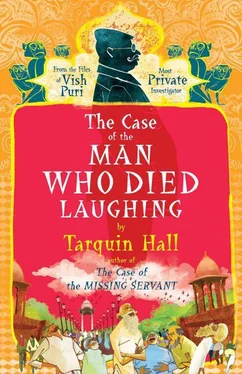Om Chander Puri had suffered a massive heart attack while out on his early morning walk. Less than twelve hours later, in accordance with Hindu custom, Puri and his brothers had carried their father’s body into the cremation ground on a stretcher and placed him in one of the forty or so shallow cremation pits that lay just a few feet apart under a blackened metal roof. A crowd of ‘near or dear’ had gathered round as a pandit had performed antim-samskara, the last rites, helping to bring the union of the soul, atma, with the Holy Spirit. Sprinkling Ganga water on the body, the priest had pulled back the cotton shroud to reveal Papa’s face, and a little honey and a small dollop of ghee had been poured into the mouth.
Slowly – carefully – Puri and his three brothers had piled pieces of wood on top of the body. Two bags of fragrant-smelling mulch had been scattered over the pyre to disguise the smell of burning flesh. And then Puri’s elder brother had applied a flame to the kindling.
Now the detective watched another family enacting the same timeless rituals in more or less the same spot where his father, and thousands of others since, had been cremated. The heat of a blaze burning nearby felt hot against his right cheek. Six other pits contained charred, smoldering hunks of wood and blackened bones. They would there remain undisturbed until the following morning, when the male relatives of the respective families would return to sift through the ashes by hand and retrieve the remains of their loved ones.
This was not where Dr. Jha was to be cremated, however. The Guru Buster, who had spent his adult life railing against religious ceremony (not to mention the precious wood that the traditional Hindu funeral demands), had left strict instructions for his body to be cremated, without fuss, in a gas incinerator.
Puri therefore turned away from the fire pits and walked the short distance to the nearby CNG (compressed natural gas) crematorium.
A more soulless structure could hardly have been imagined. Like something out of a Nazi death camp, it was built of cinder blocks and corrugated iron and there was a big, ugly chimney sticking out of the roof.
It was here that the city’s unclaimed and unidentified bodies were brought, along with the poorest of the poor. A no-frills funeral cost just 500 rupees and was devoid of aesthetics. A cavernous concourse housed six giant ovens replete with gauges, knobs and levers.
Puri arrived in time to see Dr. Jha’s body, which had been sewn into a shroud, carried onto the heavy metal trolley that fed oven number five. His widow, Ashima, who was some twelve years younger than her late husband, stood in front of it dressed in white. Her daughter had one arm around her. Both women were sobbing quietly. About seventy family members and friends were gathered around them.
The detective stood toward the back of the gathering, hands held respectfully in front of him, as one of Dr. Jha’s former colleagues from the Wireless Planning and Communications Wing, where the two had worked for some thirty years, read a touching tribute. It included a quote from Marx and an anecdote about how the deceased had once asked the Godman Sai Baba why he gave the gold chains he claimed to materialize out of thin air to the wealthy and not the poor.
This brought fond smiles to many faces.
And then Puri noticed a man standing in the shadow cast by oven number four. He was holding a video camera. Judging by the red light on the front of the device, he was recording Dr. Jha’s funeral.
It occurred to the detective that this individual might be working for a news channel, which would explain why he was standing at a distance, apparently trying to remain inconspicuous. But the camera he was holding was much smaller than the ones used by professional cameramen.
Curious, Puri began to inch to his right, hoping to get a look at the man’s face. But as he did so, everyone was asked to step back from the oven and the detective found himself hemmed in by his fellow mourners.
Two crematorium employees pushed the trolley inside the gaping mouth of the oven and the detective’s attention was drawn back to the proceedings.
A heavy metal door came down with a clang. Unceremoniously, the crematorium foreman turned a couple of knobs on the control panel, waited a couple of seconds and then pressed a red button. The oven trembled as the gas inside ignited.
The temperature gauge rose abruptly and settled on red.
A moment later, when Puri looked for the man with the video camera, he was gone.
Puri hurried home to greet his second daughter, Jaiya, who was driving from Agra with her husband.
Jaiya’s baby, Puri’s third grandchild, was due in eight weeks. As tradition demanded, she was returning to her parents’ house, where she would remain until the infant was at least a month old.
Over the past few weeks, frenetic preparations had been under way for Jaiya’s arrival, and every evening Puri had arrived home to learn that his bank balance had taken another hit. Rumpi, who could usually be relied upon to be frugal, had called in the decorators to paint the largest of the three guest rooms. The adjacent bathroom had also been retiled in matching pink. An imported coil-spring Slumber mattress (14,000 rupees!) had been procured, along with an unusually large cot, numerous sets of sheets and pillowcases printed with motifs of elephants and penguins, and countless baby outfits. A strange, boomerang-shaped pillow had also been bought at one of the exorbitant shops in the Great Mall of India – “A Mall for All.”
The detective, who kept a close watch on everything that transpired inside his house, sometimes even bugging the servants, had also discovered a large stash of imported disposable nappies hidden away in the servants’ quarters.
This had prompted him to object to the exorbitant sums being spent.
“Why you’re buying so much of everything? How many outfits this child will need? You think paisa can be plucked from trees in the jungle, my dear?”
Rumpi had said nothing to this. Emboldened, Puri had continued with his protest: “No need for all these imported products. Made in India is just as good, if not better. We were all fitted with cloth nappies and our bottoms never suffered.”
At that, his wife scowled, telling him that he was the one who needed nappies.
“Why exactly, my dear?” an incensed, bemused Puri had asked.
“Because of so much of verbal diarrhea!” she’d snapped.
The next day, the detective had opened his lunch tiffin to find it packed with celery sticks. The day after that plain bean sprouts. And so on…
To make amends, he had bought Rumpi a new mixie, something he had been putting off for months (the old one was only nine years old, after all). The model he had purchased was one of the best on the market, made in China, as almost everything was these days. According to that bloody bastard of a salesman who had refused to give a discount, “It slices and dices in a thrice.”
There had been a marked improvement in the quality of Puri’s lunches after that. But the frivolous spending had not abated.
The latest purchase, which Puri found propped against the wall in the corridor when he reached home at seven o’clock, was a plastic tub shaped like a whale. The attached price tag was for 3,500 rupees.
“By God,” muttered Puri, “it is practically a swimming pool!”
“What was that you said, husband?” asked Rumpi as she emerged from the kitchen to greet him.
“Nothing at all, my dear,” he said with a smile, refraining from pointing out that he and his brothers had all been bathed in a steel bucket and it had done them no harm. “Just I was admiring this beautiful tub. The child is going to learn swimming, is it?”
Читать дальше












